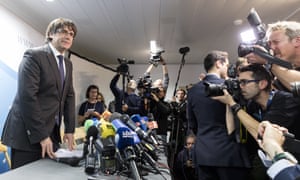
It was no accident that the sacked Catalan leader Carles Puigdemont turned up in Brussels, after vanishing from Spain. “I am here in Brussels as the capital of Europe,” he told reporters, dismissing suggestions he wanted political asylum. “I am asking for Europe to react.”
This vague call for European action was greeted with resounding silence in the corridors of Brussels and other EU capitals. Only the Belgian government offered any response, forced by the media furore his arrival created. “Mr Puigdemont is in Belgium, neither at the invitation or the initiative of the Belgian government,” said a statement from the prime minister’s office, calling for political dialogue in Spain.
The silence was revealing. Soon after the Spanish prime minister, Mariano Rajoy, announced on Friday he was calling fresh elections in Catalonia, Donald Tusk spelled out the EU view. “Spain remains our only interlocutor,” the European council president tweeted, adding a barely concealed warning against a repeat of the scenes of police violence. “I hope the Spanish government favours force of argument, not argument of force.”
The EU lacks any legal mechanism to get involved, say senior officials. While the European commission is tussling with rightwing populist governments in Poland and Hungary over the rule of law, Spain is a very different case.
Poland’s proposed changes to the constitutional court and Hungary’s restrictions on NGOs and a university strike at the heart of the rule of law and democratic values, but Spain is seen as capable of fixing its own political conflicts. “Spain is a democratic country; they respect the judiciary,” said one EU source, adding that the situation was “awful” because Rajoy had made so many mistakes.
Colouring the Brussels view is the fact the EU is a club of nation states that fears splintering into tiny statelets. “I do not want a situation where, tomorrow, the European Union is made up of 95 different states,” said Jean-Claude Juncker, the head of the European commission. “We already have enough splits and fractures.” Under the Lisbon treaty, the EU will respect “essential state functions, including ensuring the territorial integrity of the state”. Allowing Catalonia to enter the EU on the back of a hasty, illegal referendum would set a precedent for other regions, such as Flanders, Corsica or South Tyrol.
Youngs also thinks, however, the EU should have been doing more behind the scenes to cajole both sides to an agreement, in the years building up to the current crisis.Richard Youngs, senior fellow at Carnegie Europe, thinks the EU has made the correct call in supporting Spain’s legal argument. “The way the Catalan government is going is clearly not the way to succeed and there is no realistic chance of creating an independent state in this way,” he said.
“Now [Madrid] should accept that as this crisis becomes more serious it has an effect on the EU politically, economically, socially. And therefore the EU does have a stake in this crisis.” But he sees this role as informal and only with the agreement of the Spanish government.
In the days leading up to the suspension of direct rule in Catalonia, one senior diplomat repeated there was no role for the EU, but speculated how it might happen. “My advice would be to do it in silence.”
The EU’s muted response to the Catalan crisis, especially the police brutality on referendum day, has opened the bloc to criticism from across the political spectrum.
However, Francisco de Borja Lasheras, the head of the Madrid office of the European council on foreign relations in Madrid, describes the EU’s role as positive. He said the EU has helped to uphold the rule of law in Catalonia, after “a wafer-thin majority” in the Catalan parliament “rode roughshod” over parliamentary rules to introduce the referendum.
“You have two competing visions of democracy that we see replicated across the west. One is a so-called plebiscite, people’s will democracy against a pluralistic, institutional and rule of law democracy. The current leaders of the secessionist camp have been arguing that they represent the people of Catalonia but they only represent a part of it.”
De Borja Lasheras supported calls for investigation into excessive police force to be carried out by the Council of Europe (a non-EU body). While he thinks statements by EU leaders have been helpful, he hopes Brussels will maintain some distance. Deeper EU involvement would be very bad for Spanish democracy, he said. “I think we need to find our own way.”
Based on the icy silence Puigdemont has encountered in Brussels, it appears the EU will continue to rely on the Spanish to resolve this crisis.

No comments:
Post a Comment